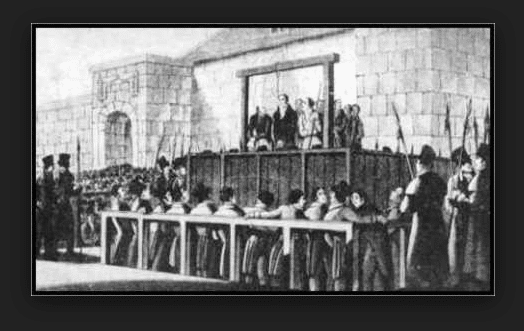March 11th, 1811 is a black-letter day in the annals of Nottinghamshire. It witnessed the commencement of a series of riots which, extending over a period of five years, have, perhaps, no parallel in the history of a civilized country for the skill and secrecy with which they were managed, and the amount of wanton mischief they inflicted.
~ Chambers Book of Days, 1864 (of the Luddite uprising) (online version here - scroll down)
Machines were, it may be said, the weapon employed by the capitalists to quell the revolt of specialized labor.
~ Karl Marx (1818-1883) (The Poverty of Philosophy, Ch. 5)
I'm afraid for all those who will have the bread snatched from their mouths by these machines... What business does science and capitalism got, bringing all these new inventions into the works, before society has produced a generation educated up to using them!
~ Henrik Ibsen (1828-1906) (Aune, in Pillars of Society, Act II)
By his very success in inventing labor-saving devices, modern man has manufactured an abyss of boredom that only the privileged classes in earlier civilizations have ever fathomed.*
~ Lewis Mumford (1895-1990) ("The Challenge of Renewal," in The Conduct of Life)
 |
| The mass Luddite trial at York |
Industrial man - a sentient reciprocating engine having a fluctuating output, coupled to an iron wheel rotating with uniform velocity. And then we wonder why this should be the golden age of revolution and mental derangement.
~ Aldous Huxley (1894-1963) (Time Must Have a Stop, Ch. 30)
March 11 is the anniversary of the first of the Luddite (wiki) riots in 1811, at the village of Arnold near Nottingham, England, where a group of disgruntled hand weavers, concerned with the threat of newly introduced textile machinery to their livelihood, smashed a number of knitting frames. Supposedly led by a young apprentice, Ned Ludd, the movement spread quickly to other textile-producing areas in Yorkshire and Lancashire, and widespread damage was done to textile machinery.
The riots were put down by the British government with the army and with draconian punishments: the troops were sent in to control the Luddites, and the government followed it up with the Frame Breaking Act of 1812 which made the breaking of machines a capital felony. They held a mass trial of those caught in 1813 and executed 17 men - others were sent to penal colonies. The harsh punishments meted out did stop the Luddite protests, but in all between 60 and 70 people were executed.**
Although the Luddites were not opposed to machinery per se - but rather to the devaluing of their specialized skills by its introduction to the industry - the term Luddite has come to be applied pejoratively to anyone opposed to modern technology and its sociological effects. Be that as it may, that same issue arises today with the spread of automation and its inevitable elimination of many jobs. On the other hand, as Czech writer, Karel Cepad (1890-1938) has noted,
"Man will never be enslaved by machinery if the man tending the machine be paid enough."
* N.B. I am reminded of Voltaire's famous observation, "Work banishes those three great evils - poverty, boredom, and vice."
** English historian Eric Hobsbawm (1917-2012) has called the Luddites' wrecking of machinery as "collective bargaining by riot."
A brief video on the Luddite uprising:


No comments:
Post a Comment